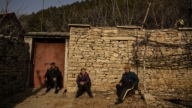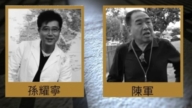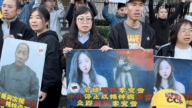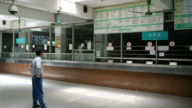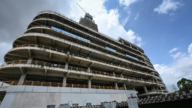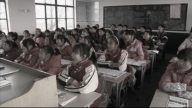【新唐人2011年7月4日讯】中共今年“七一”庆生,一方面营造“歌舞升平”的气氛,另一方面,却大量关押大陆访民和抓捕异议人士。中共总书记胡锦涛还在今年的党庆大会上,明确提出“稳定是硬任务”。港民则在七一当天,进行了近年来最大规模的示威游行,以表达对中共和港府的不满,声援大陆受压迫的同胞。
“七一”前后,北京当局极力渲染红色的“党庆”气氛。胡锦涛在七一讲话上声称,中共除了人民利益,没有所谓“自己的特殊利益”,“要奉献人民”。但是他又提出“稳定是硬任务”,把“维稳”提到了一个新高度。
近期,到北京上访的访民日渐增多。中共更是直接将“信访办”设在了一向用来关押访民的“久敬庄”。
被称为福建维权斗士的纪斯尊告诉《新唐人》记者,到北京信访的访民多达几万人。当局将他们集中关押在“久敬庄”,里面人山人海,人满为患,访民们几乎都没吃没喝。
纪斯尊自己也因为到全国人大信访办上访,结果被扣押在“久敬庄”。
纪斯尊:“因为大家不愿意在里面,大家要出来,但保安不让他们出来,然后双方就发生冲突了。整天都是冲突不断的,不断的争吵。大家当然要出来,要恢复人身自由的,他就不让,严格限制人身自由。这次连特警都出动了。上访人员有几万人,都全部集中到里边去了,所以我把它叫作‘集中营’。”
另一位不愿透露姓名的新疆维权人士,通过长期以来对大陆访民的接触和了解,发现“久敬庄”和另一处上访“救济中心”—-“马加楼”,其实就是“黑监狱”。
新疆维权人士:“最早的时候(关押访民)是在‘马家楼’,但是因为马家楼当时设施,各方面比较小一点,不够装那麽多访民。所以它现在在‘久敬庄’又重新建了一个大的,可以说是变相的监狱。它一般从各个信访口搜集的访民用大客车拉了以后,就送到‘久敬庄’或者送到‘马家楼’。羁押人的时间一般最长的在十几天半个月,短的两三天”
独立中文笔会成员、香港《开放》杂志主编蔡咏梅表示,中国社会不稳定的问题,突出表现在政府全力阻截、打压上访人员方面。访民上访是因为他们没有地方申诉。
蔡咏梅:“上访全世界都没有,只有中国有。为什么去上访找官员给你解决呢?如果这个社会有法律机制,大家就去打官司。就是说你没有一个渠道,就等于把人逼上梁山了。”
此外,一些大陆异议人士在“七一”敏感日也惨遭打压。
据《自由亚洲电台》报导,在贵阳,“贵州人权研讨会”活动因“七一”而受到干扰、无法进行,多名骨干成员被软禁在家,或被带离贵阳﹔其中一名骨干成员莫建刚表示,他在前一天就被警察带到外地,期间还遭到一名国保大队长的暴力对待。
在浙江杭州,多名民主党人士,包括邹巍、吴义龙等,“七一”当天也分别被国保“约喝茶”。
而在只有一岸之遥的香港特区,“七一”当天的景象却大不相同。
7月1号,21万8千香港民众上街游行,向港府和中共政权的苛政与恶法发出怒吼,要求行政长官曾荫权下台,要求“打倒共产党”。
有大陆游客看到壮观的游行队伍后表示非常振奋。
大陆游客:“我很羡慕香港的老百姓,我希望香港坚持到底,把这个民主自由的风气带到中国大陆,让全中国的人民都能够享受到这样的民主自由,这样中国才有希望。”
而蔡咏梅说,自从89年的六四以后,香港十多年来都是游行抗议不断,但是香港的社会稳定和秩序是没有问题的,社会的运作也是很正常的。
她还表示,一个限制表达的社会就像是一个高压锅,如果不给发泄的出气孔,最终的结果就是爆炸,彻底毁灭。
新唐人记者常春、李明飞、葛雷采访报导。
CCP Uses Violence to “Maintain Stability"
Although the Chinese Communist Party (CCP) tries
to create a “peaceful" scene, while it celebrates its
90th anniversary, it still detains dissidents.
In a July 1 speech, the CCP’s General Secretary
Hu Jintao stated that “stability is a hard task."
The largest protest march in recent years was held
in Hong Kong on July 1st, as people expressed
their support for their oppressed compatriots,
as well as their dissatisfaction with the CCP and
the Hong Kong government.
In his July 1st speech, Hu Jintao claimed that
the CCP doesn’t have its own “special interests,"
so it should be “dedicated to the people."
However, he also said, “stability is a hard task,"
thus, raising the need for “maintaining stability"
to new heights.
Recently, the number of Beijing-bound petitioners
has dramatically increased.
To detain petitioners, the CCP has moved
the Office for Petitions and Appeals
close to an illegal prison called “Jiujingzhuang."
Known as Fujian Province’s human rights warrior,
Ji Sizun told NTDTV that tens of thousands of
petitioners across China came to the Central Office.
Authorities threw the petitioners into Jiujingzhuang,
which was completely packed and supplied them
with little food or water.
Ji Sizun was also detained in Jiujingzhuang,
for petitioning in Beijing.
Ji Sizun: “All detainees wanted to be released,
however, the security guards would not release them.
Then, the two sides constantly clashed and argued.
A special police force was even dispatched.
Since tens of thousands of petitioners are detained
there, I call Jiujingzhuang a concentration camp."
An anonymous activist from Xinjiang discovered
Jiujingzhuang and another petition “relief center."
Majialou, which is in fact an illegal prison.
Rights Activist from Xinjiang:
“Majialou was the first place [to detain petitioners].
Since it is a small facility, the authorities built
Jiujingzhuang, which looks exactly like a large prison.
Petitioners are ‘collected’ from different offices
and bussed to these illegal prisons.
They are detained from several days, up to 2 weeks."
Hong Kong Open magazine editor, Cai Yongmei,
said, “China’s social instability is most clearly seen
in the CCP’s effort to suppress petitioners, who only
petition because they have no place to appeal."
Cai Yongmei: “Petitions only exists in China.
Why do petitioners seek help from senior officials?
Because of the lack of judiciary protocols.
If protocols existed, they would go to court instead.
If people don’t have a channel to solve problems,
they will eventually revolt."
Also, some mainland dissidents were suppressed
on July 1st, a so-called “sensitive day."
According to Radio Free Asia in Guiyang,
Guizhou Seminar on Human Rights was disrupted,
and key members were put under house arrest
or were taken away by authorities.
One key member, Mo Jiangang said that police
manhandled him as they lead him away.
In Hangzhou, many democracy activists, such as
Zou Wei and Wu Yilong, were summoned by police.
It was a different story in Hong Kong SAR.
On July 1, about 218,000 people took to the streets
shouting, “Down with the CCP!" demanding
that Chief Executive Donald Tsang step down.
Mainland tourists were very excited by the march.
Mainland tourist: “I envy the people of Hong Kong.
I hope that Hong Kong can persist to the end
and bring democracy and freedom to the mainland.
Only when all Chinese can enjoy freedom and
democracy, will China have any hope."
Cai said that since the Tiananmen Massacre in 1989,
“There have been continuous protests in Hong Kong.
However, there’s no problem regarding Hong Kong’s
social stability or order; it functions normally."
Cai said, “A society that restricts its people’s
right to express their views is like a pressure cooker.
Without a way to vent their discontent,
the society will explode and be destroyed."
NTD reporters Chang Chun,Li Mingfei and Ge Lei


